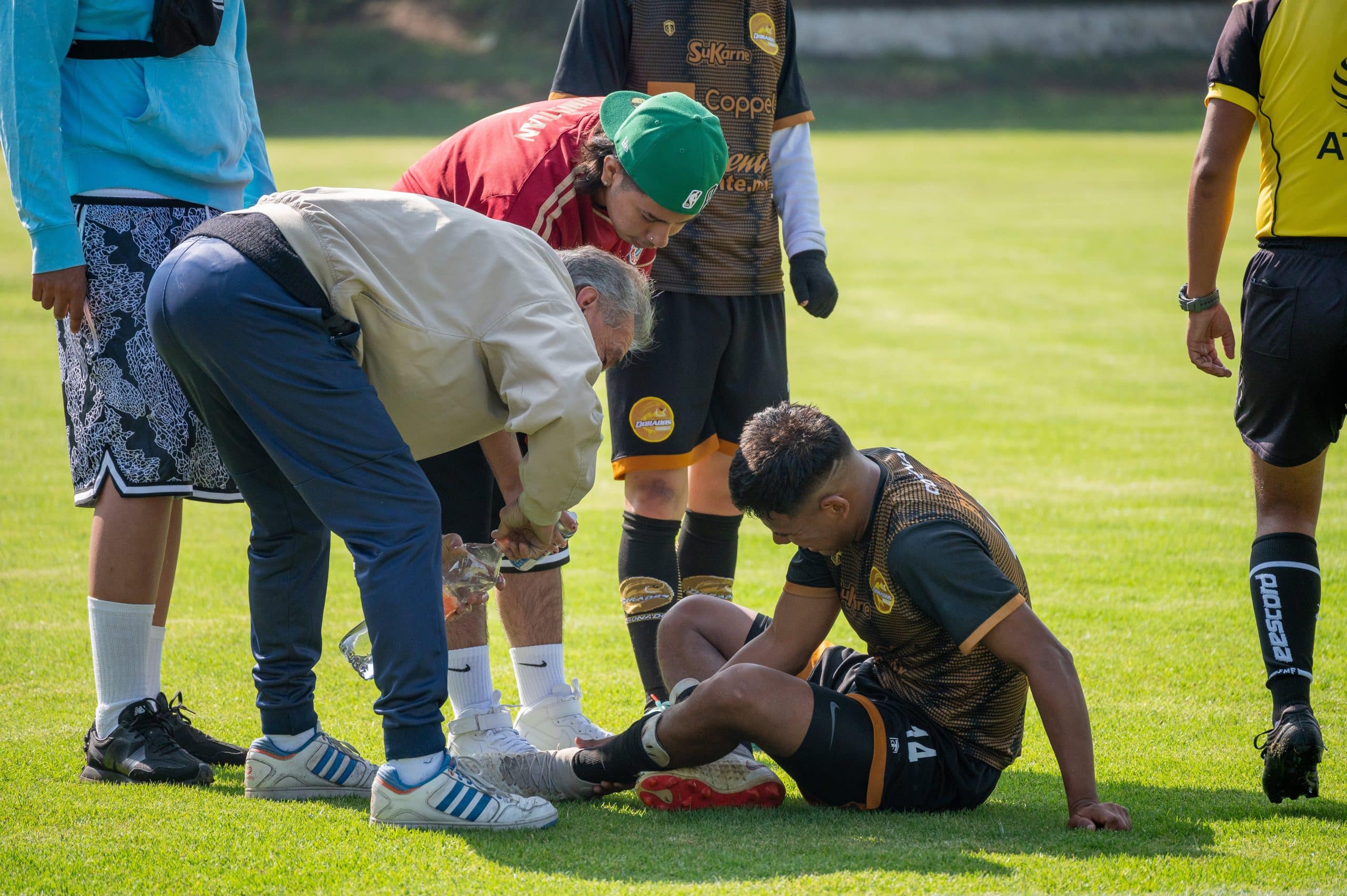As fans of sports, we often marvel at the physical prowess of athletes, their strength, and their impeccable performance on the field. However, what is often overlooked is the mental aspect that plays a significant role in athletic achievement. What’s more, when an athlete sustains an injury, it’s not just their physical health that takes a hit. The psychological toll can be significant, particularly for long-term injuries. In this article, we discuss the mental effects of long-term sports injuries, covering topics such as anxiety, the impact of time out of sport, and the role of psychological support in the rehab process.
The Psychological Impact of Injuries in Sports
When an athlete gets injured, the immediate focus is usually on the physical damage. But beneath the surface, a psychological storm may be brewing, as the athlete grapples with the reality of the injury, the prolonged recovery time, and the uncertainty of their future in the sport.
Cela peut vous intéresser : Trailblazing: the rise of outdoor adventure sports
An injury can trigger a range of emotional responses, from immediate shock and denial to frustration and anger. However, the most profound psychological effects often emerge during the long haul of recovery. They may experience feelings of isolation, as their injury forces them to spend less time with their teammates and more time in physiotherapy or at home. This separation can lead to feelings of loneliness and a loss of identity, particularly if the athlete has dedicated their life to the sport.
Furthermore, the athlete may experience a significant amount of anxiety. They may worry about their ability to regain their previous performance level, fear re-injury, or feel anxious about how their career may be impacted by a prolonged absence. Overall, the psychological impact of a long-term injury can be just as debilitating, if not more so, than the physical injury itself.
Lire également : What’s the latest in hydrotherapy and aquatic training for athletes?
The Impact of Time Out of Sport
Time away from sport due to injury can be a challenging period for athletes. After all, their routine, objectives, and sense of self are often deeply connected to their sport. This hiatus from the sport can lead to feelings of disconnection, loss, and even depression.
The longer the recovery time, the more intense these feelings can become. An extended break from sport can cause an athlete to lose confidence in their abilities. They may start questioning their competencies and their future in the sport, which can exacerbate feelings of anxiety and depression.
Additionally, their physical well-being can also take a hit during this time. As they are unable to exercise at their usual intensity, they may start to feel physically weaker. This perceived loss of physical fitness can further add to their psychological distress.
The Role of Rehabilitation in Psychological Recovery
A comprehensive rehabilitation program is crucial for an injured athlete – and this doesn’t just mean physical rehabilitation. It’s equally vital to address the psychological elements of recovery.
Rehabilitation should not merely focus on helping the athlete regain their physical fitness. It should also help them cope with the emotional turbulence that comes with a long-term injury. Incorporating mental health support in the rehab process can be a game-changer. This could take the form of regular sessions with a sports psychologist or therapist, mindfulness training, or support groups with other injured athletes.
A well-rounded rehabilitation program can help the athlete overcome feelings of isolation by fostering connections with others in similar situations. It can also address the athlete’s fears and anxieties, building their mental resilience and preparing them for their return to the sport.
The Exercise of Mental Strength
Physical strength alone is not enough to excel in sports. Mental toughness plays an equally important role. An athlete’s mental state can significantly influence their performance, their response to setbacks, and their overall satisfaction with their sport.
When an athlete is injured, their mental strength is put to the test. The journey of recovery involves not just regaining physical strength but also rebuilding mental resilience. This includes learning to manage pain, staying motivated during the tedious process of rehabilitation, maintaining a positive attitude, and dealing with setbacks.
By focusing on mental strength during recovery, an athlete can return to their sport mentally tougher than before. This mental resilience can not only help them navigate future challenges in their sport but also in life beyond athletics.
The Long-Term Impact on Athletes
A long-term injury can change an athlete’s life, both on and off the field. It can force them to reassess their relationship with their sport, their career goals, and their identity. But with the right support, an injury can also spur growth. It can build resilience, teach the athlete valuable coping skills, and deepen their understanding of themselves.
However, it’s important to remember that every athlete’s experience with injury and recovery is unique. Some may bounce back stronger, while others may struggle with the psychological impact for a long time. Therefore, it’s crucial to provide ongoing mental health support to athletes, both during and after their recovery, to help them navigate this challenging period in their career.
Indeed, long-term sports injuries can have profound psychological effects on athletes. But with the right support and resources, these hurdles can be overcome, turning a period of adversity into an opportunity for growth and self-discovery.
Psychological Support: A New Approach in Sports Medicine
Sports medicine has often been focused on treating the physical aspect of sports injuries. Yet, in recent times, there has been a shift towards a more holistic approach that also incorporates the psychological aspect of recovery. This realization has led to the integration of mental health care into the treatment plan for injured athletes.
The incorporation of psychological support in the rehab process is crucial, particularly for long-term injuries. This is because such injuries often have a significant emotional impact, leading to emotional responses like anxiety, depression, and even a loss of identity. Thus, alongside treating the physical injury, it’s equally important that the athlete’s mental health is also taken care of.
Sports psychologists or therapists can play a significant role here. Regular therapy sessions can provide a safe space for athletes to vent their frustrations, fears, and anxieties. A sports psychologist can also equip the athlete with strategies to cope with their emotional turmoil, thus strengthening their mental resilience.
Support groups can also be beneficial. Sharing experiences with other injured athletes can alleviate feelings of isolation and provide a much-needed morale boost.
Additionally, incorporating mindfulness training in the rehab process can teach the athletes to stay present-focused, which can be particularly helpful in managing pain and maintaining a positive attitude during the tedious process of rehabilitation.
Female athletes, who are often underrepresented in sports research, may particularly benefit from these psychological support measures, as they often report higher levels of psychological distress following a sports injury.
Concluding Thoughts: The Road to Recovery and Beyond
The psychological impact of a long-term sports injury can be profound and far-reaching. It can affect not just the athlete’s performance on the field but also their mental and emotional well-being off the field. However, with the right support and resources, these obstacles can be surmounted, transforming a challenging period into a chance for personal growth and self-realization.
Addressing the mental health of injured athletes should not be an afterthought in sports medicine. Instead, it should be an integral part of the recovery process, as crucial as the physical rehabilitation. Healthcare providers should, therefore, incorporate mental health care into their treatment plans for long-term sports injuries.
Finally, it’s important to remember that the journey to recovery is different for every athlete. It’s a complex process that involves not just healing the physical wound but also dealing with the psychological fallout. Therefore, the approach to recovery needs to be individualized, considering the unique psychological responses and coping mechanisms of each athlete.
In conclusion, the psychological effects of long-term sports injuries can be significant. But with the right approach – one that combines physical rehabilitation with mental health care – these effects can be mitigated, and athletes can return to sport stronger and more resilient than before.






